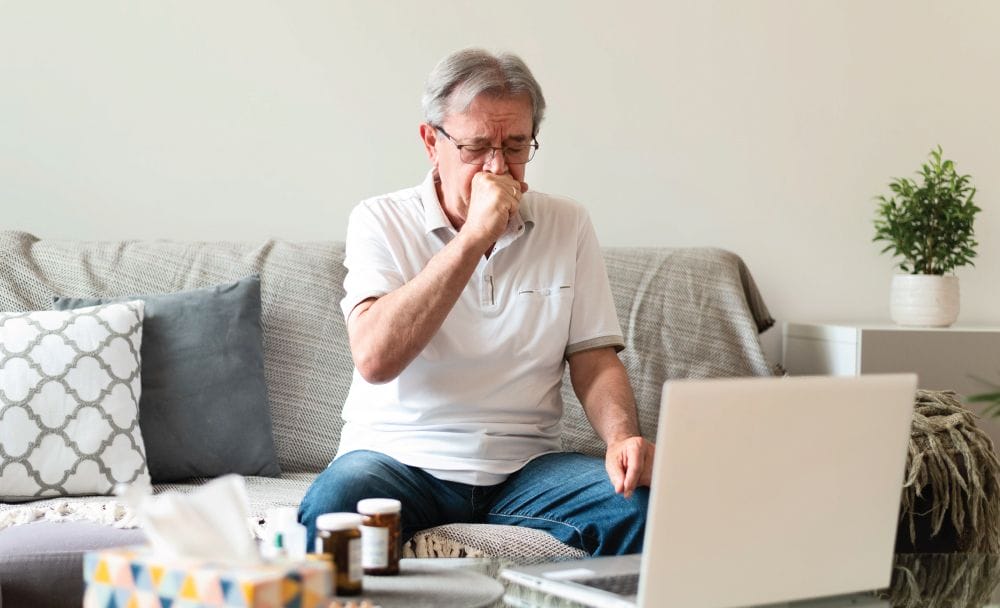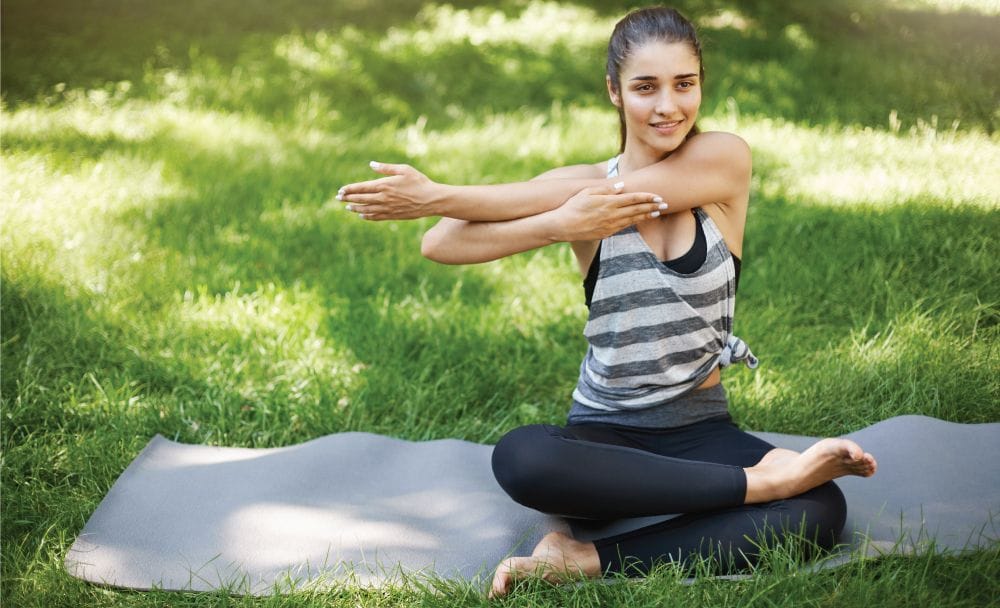This article is reviewed by an expert
Pneumonia is a respiratory infection that affects the lungs. It can be caused by bacteria, viruses, or other microorganisms. It can be a serious condition, especially for older adults, young children, and people with weakened immune systems. [1][2] In this article, we will provide an overview of pneumonia, including its causes, symptoms, diagnosis, and treatment. Additionally, we will explore how Ayurveda, an ancient Indian system of medicine, can offer natural remedies to help manage pneumonia.
Overview of Pneumonia
Pneumonia is a lung infection that can affect one or both lungs. It occurs when bacteria, viruses, or other microorganisms enter the lungs and cause inflammation. The inflammation can cause the air sacs in the lungs to fill up with fluid or pus, which can make it difficult to breathe. [1][2]
Symptoms of Pneumonia
The symptoms of pneumonia can vary depending on the cause of the infection, the age and health of the person affected, and the severity of the illness. However, some common symptoms of pneumonia include:[3]
- Coughing (may produce phlegm or mucus)
- Shortness of breath
- Chest pain (may worsen when breathing or coughing)
- Fever
- Chills
- Fatigue
- Nausea and vomiting
- Sweating
Causes of Pneumonia
Pneumonia can be caused by various microorganisms, including bacteria, viruses, fungi, and parasites. Some of the most common causes of pneumonia include:
Bacteria
Bacteria are a prevalent factor in causing pneumonia among adults. Although various kinds of bacteria can trigger pneumonia, Streptococcus pneumoniae (also known as pneumococcus bacteria) is the most common. [4]
In some cases, bacteria can cause pneumonia with distinct symptoms or other distinguishing features from typical pneumonia. This type of infection is termed atypical pneumonia. For instance, Mycoplasma pneumoniae is responsible for a milder form of pneumonia commonly referred to as “walking pneumonia.” On the other hand, Legionella pneumophila causes a severe form of pneumonia known as Legionnaires’ disease. Bacterial pneumonia may develop independently or after contracting a cold or the flu. [4]
Virus
Pneumonia can be caused by viruses that invade your lungs and airways. The flu, caused by the influenza virus, and the common cold, caused by rhinovirus, are the primary culprits of viral pneumonia among adults. In young children, respiratory syncytial virus (RSV) is the leading cause of viral pneumonia. Several other viruses have the potential to trigger pneumonia, including SARS-CoV-2, which causes COVID-19. [4]
Fungi
Individuals with weakened immune systems are at risk of developing pneumonia due to fungi, such as Pneumocystis jirovecii. [4]
Diagnosis of Pneumonia as per Modern Medicine
If you are experiencing symptoms of pneumonia, it is important to see a healthcare provider for a diagnosis. Your healthcare provider may perform a physical exam, which may include listening to your lungs with a stethoscope to check for abnormal sounds. They may also order diagnostic tests, such as a chest X-ray, blood tests, or a sputum test (a test that analyzes a sample of mucus coughed up from the lungs) to confirm a diagnosis of pneumonia. [5]
Treatment of Pneumonia
Treatment for pneumonia typically involves antibiotics or antiviral medications, depending on the cause of the infection. In some cases, hospitalization may be necessary, especially for people who are at high risk of complications, such as older adults, young children, and people with weakened immune systems. Treatment may also involve oxygen therapy, which can help improve breathing. [6]
Ayurvedic Remedies for Pneumonia
Ayurveda recommends a comprehensive approach to treating pneumonia, which involves avoiding the underlying causes of the disease (Nidanaparivarjana), eliminating the root cause (Apakarshana), and modifying the internal environment of the body to make it less hospitable to the infectious agent (Prakritivighata). [7]
External Therapies
The initial step in managing respiratory illnesses like pneumonia involves oil massages and steam. This helps to regulate sensory and tissue stimulation, leading to vasodilation. As a result, it becomes easier to expectorate the sticky sputum that can block ventilation and reduce lung capacity during inhalation. [7]
Other external therapies such as yoga sessions, require individuals to perform bedside pranayama practices and movements that improve chest expansion, such as gentle warm-up exercises coordinated with breathing called sukshma vyayama. These practices involve stretching and bending to loosen the muscles. Afterward, sukshma kriya and pranayama are performed to cleanse the respiratory channels of toxins. [7]
Herbal Treatments
The Ayurvedic system emphasizes the importance of preventing diseases through lifestyle and dietary management, as well as through Rasayana therapy. This therapy is believed to be effective in promoting non-specific immunity and preventing various diseases.[7][8][9]
Rasayana is a comprehensive discipline of Ayurveda that involves the specialized use of herbs, herbomineral formulations, food, and lifestyle practices, as well as self-discipline and social etiquette. Its goal is to achieve the optimal state of tissues and bodily systems, minimizing the effects of etiological factors on the body. To potentially improve the quality of life for patients, Ayurveda advocates the use of Rasayana drugs as an adjuvant to their ongoing medications, which may lead to encouraging results. [7][8][9] Herbal ingredients for ayurvedic treatment include Turmeric, Garlic, Ginger, Tulsi, Eucalyptus, etc. to name a few.
Ayurveda also emphasizes the importance of maintaining a healthy lifestyle to prevent and manage respiratory infections like pneumonia. This includes eating a healthy diet, getting enough sleep, and managing stress.[7]
It is important to note that Ayurvedic remedies should be used in conjunction with conventional medical treatment for pneumonia. While natural remedies can help manage symptoms and support the immune system, antibiotics or antiviral medications may still be necessary to fully treat the infection. Remember to consult a trained medical practitioner before starting any treatment.
FAQs
1. Can pneumonia be prevented with vaccines?
Yes, vaccines can help prevent certain types of pneumonia. The pneumococcal vaccine and the flu vaccine are recommended for adults over the age of 65 and those with underlying health conditions that increase their risk of pneumonia.
2. How long does it take to recover from pneumonia?
The recovery time for pneumonia can vary depending on the severity of the infection and the individual’s overall health. Generally, it can take anywhere from a few days to several weeks to fully recover.
3. Can pneumonia be contagious?
Yes, pneumonia can be contagious, especially if it is caused by a bacterial or viral infection. It can spread through coughing or sneezing, so it is important to practice good hygiene and avoid close contact with others when sick.
4. Can pneumonia lead to other health problems?
Yes, untreated or severe cases of pneumonia can lead to complications such as respiratory failure, sepsis, and lung abscesses. It can also increase the risk of developing other respiratory conditions like asthma or chronic obstructive pulmonary disease (COPD).
5. Are there any long-term effects of pneumonia?
In some cases, pneumonia can lead to scarring or damage to the lungs, which can cause long-term breathing problems. It can also increase the risk of developing pneumonia again in the future. It is important to follow up with a healthcare provider after recovering from pneumonia to monitor any potential long-term effects.
Conclusion
Pneumonia is a serious respiratory infection that can cause significant health problems, especially in vulnerable populations. It is important to seek medical attention for pneumonia and to work with a healthcare provider to determine the best course of treatment, whether it be conventional medical treatment or Ayurvedic remedies.
Disclaimer: This article explores Diabetes from a Modern Medicine perspective with some ayurvedic remedies which are not replacements for conventional treatments but are meant to be used alongside them. Kindly seek the assistance of a trained medical practitioner for diagnosis and treatment every time before incorporating any of the mentioned remedies into your daily routine.
Reference:
- Pneumonia (who.int)
- Pneumonia – What Is Pneumonia? | NHLBI, NIH
- Pneumonia – Symptoms | NHLBI, NIH
- Pneumonia – Causes and Risk Factors | NHLBI, NIH
- Pneumonia – Diagnosis | NHLBI, NIH
- Pneumonia – Treatment | NHLBI, NIH
- Ayurveda management of pulmonary mycosis: an integrative approach: a case report – PMC (nih.gov)
- ROLE OF RASAYAN IN COMMUNICABLE DISEASE (Janapadodhwamsa) (researchgate.net)
- Rasayana in perspective of the present scenario – PMC (nih.gov)
- Antiviral and immunomodulatory activity of curcumin: A case for prophylactic therapy for COVID-19
- Antimicrobial-Effect-of-Garlic-Allium-sativum-and-Traditional-Medicine.pdf (researchgate.net)
- Antibacterial Activity of Ginger (Zingiber officinale) Against Isolated Bacteria from the Respiratory Tract Infections
- In-vitro-Antibacterial-study-of-two-commonly-used-medicinal-plants-in-Ayurveda-Neem-Azadirachta-indica-L-and-Tulsi-Ocimum-sanctum-L.pdf (researchgate.net)
- Growing immunity boosting herbs: Need of the hour
- Antibacterial, antifungal and antioxidant activities of honey
- Immune-Modifying and Antimicrobial Effects of Eucalyptus Oil and Simple Inhalation Devices (researchgate.net)



















